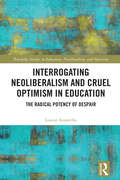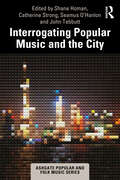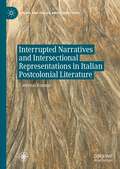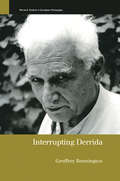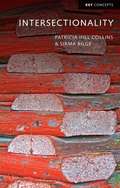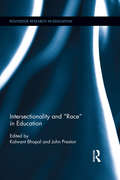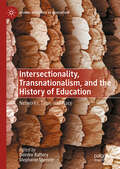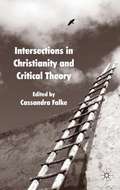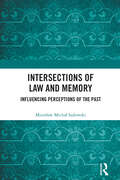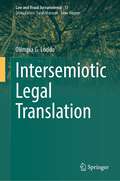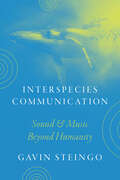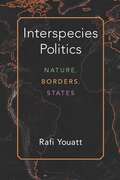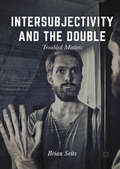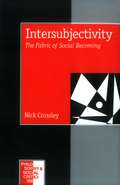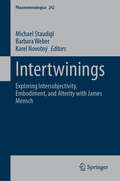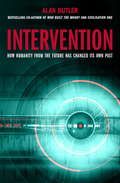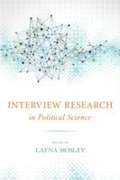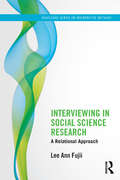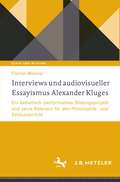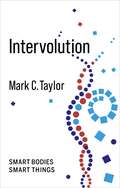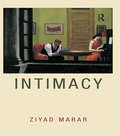- Table View
- List View
Interrogating Neoliberalism and Cruel Optimism in Education: The Radical Potency of Despair (Routledge Studies in Education, Neoliberalism, and Marxism)
by Louise AzzarelloThis book is a philosophical examination of the ways in which neoliberalism underpins and impedes public education. It proposes that education’s adoption of neoliberal logic generates a sense of despair amongst educators, who often enter the profession with the hope of building a better, more just world.Drawing on the author’s 27 years of experience as a secondary classroom teacher and engaging with a range of theoretical concepts, cultural objects, and scenes of violence from her time in the classroom, The Radical Potency of Despair renders visible the ongoing harms that neoliberal logic creates for education and educators. The author proposes a new “ruptured fantasy of education” and suggests that it is not hope that ignites educators who keep fighting for education, but rather despair. Despair is conceived of as a generative force, provoking educators to hold time and space open for pedagogical encounters that interrupt the ongoing instrumentalization of education. The author further conceptualizes a notion of thinking with images as a pedagogical interruptive force. Thinking with images, she argues, gives students time and space to attend to what they see, thus affording them the chance to think differently about the violence of modern society. Such pedagogical interruptions are presented as a refusal of the normative order of education, countering present infrastructures that aim to constrain and instrumentalize education.A compelling and original volume, it will appeal to scholars, researchers, and upper-level students with interests in neoliberalism and education, the philosophy of education, critical pedagogy, and educational policy and politics.
Interrogating Popular Music and the City (ISSN)
by Catherine Strong Shane Homan Seamus O'Hanlon John TebbuttHow does popular music influence the culture and reputation of a city, and what does a city do to popular music? Interrogating Popular Music and the City examines the ways in which urban environments and music cultures intersect in various locales around the globe. Music and cities have been partners in an often clumsy, sometimes accidental but always exciting dance. Heritage and immigration, noise and art, policy and politics are some of the topics that are addressed in this critical examination of relationships between cities and music. The book draws upon an international array of researchers, encompassing hip hop in Beijing; the city favelas of Brazil; from Melbourne bars to European parliaments; to heritage and tourism debates in Salzburg and Manchester. In doing so, it interrogates the different agendas of audiences, musicians and policy-makers in distinct urban settings.
Interrupted Narratives and Intersectional Representations in Italian Postcolonial Literature (Italian and Italian American Studies)
by Caterina RomeoThis book argues for the importance of adopting a postcolonial perspective in analysing contemporary Italian culture and literature. Originally published in Italian in 2018 as Riscrivere la nazione: La letteratura italiana postcoloniale, this new English translation brings to light the connections between the present, the colonial past and the great historical waves of international and intranational migration. By doing so, the book shows how a sense of Italian national identity emerged, at least in part, as the result of different migrations and why there is such a strong resistance in Italy to extending the privilege of italianità, or Italianness, to those who have arrived on Italian soil in recent years. Exploring over 100 texts written by migrant and second-generation writers, the book takes an intersectional approach to understanding gender and race in Italian identity. It connects these literary and cultural contexts to the Italian colonial past, while also looking outwards to a more diffuse postcolonial condition in Europe.
Interrupting Derrida (Warwick Studies in European Philosophy)
by Geoffrey BenningtonOne of the most significant contemporary thinkers in continental philosophy, Jacques Derrida’s work continues to attract heated commentary among philosophers, literary critics, social and cultural theorists, architects and artists. This major new work by world renowned Derrida scholar and translator, Geoffrey Bennington, presents incisive new readings of both Derrida and interpretations of his work. Part one sets out Derrida’s work as a whole and examines its relevance to, and ‘interruption’ of, the traditional domains of ethics, politics and literature. The second part of the book presents compelling insights into some important motifs in Derrida’s work, such as death, friendship, psychoanalysis, time and endings. The final section introduces trenchant appraisals of other influential accounts of Derrida’s work. This influential and original contribution to the literature on Derrida is marked by a commitment to clarity and accuracy, but also by a refusal to simplify Derrida’s often difficult thought.
Intersectionality
by Patrica Hill Collins Sirma BilgeThe concept of intersectionality has become a hot topic in academic and activist circles alike. But what exactly does it mean, and why has it emerged as such a vital lens through which to explore how social inequalities of race, class, gender, sexuality, age, ability and ethnicity shape one another? In this new book Patricia Hill Collins and Sirma Bilge provide a much-needed, introduction to the field of intersectional knowledge and praxis. They analyze the emergence, growth and contours of the concept and show how intersectional frameworks speak to topics as diverse as human rights, neoliberalism, identity politics, immigration, hip hop, global social protest, diversity, digital media, Black feminism in Brazil, violence and World Cup soccer. Accessibly written and drawing on a plethora of lively examples to illustrate its arguments, the book highlights intersectionality's potential for understanding inequality and bringing about social justice oriented change. Intersectionality will be an invaluable resource for anyone grappling with the main ideas, debates and new directions in this field.
Intersectionality and Race in Education (Routledge Research in Education)
by Kalwant Bhopal and John PrestonEducation is a controversial subject in which difficult and contested discourses are the norm. Individuals in education experience multiple inequalities and have diverse identifications that cannot necessarily be captured by one theoretical perspective alone. This edited collection draws on empirical and theoretical research to examine the intersections of "race," gender and class, alongside other aspects of personhood, within education. Contributors from the fields of education and sociology seek to locate the dimensions of difference and identity within recent theoretical discourses such as Critical Race Theory, Judith Butler and ‘queer’ theory, post-structural approaches and multicultural models, as they analyze whiteness and the education experience of minority ethnic groups. By combining a mix of intellectually rigorous, accessible, and controversial chapters, this book presents a distinctive and engaging voice, one that seeks to broaden the understanding of education research beyond the confines of the education sphere into an arena of sociological and cultural discourse.
Intersectionality, Transnationalism, and the History of Education: Networks, Time, and Place (Global Histories of Education)
by Deirdre Raftery Stephanie SpencerThis volume brings together a diverse range of contributors to explore the significance of intersectionality and transnationalism, with reference to the history of education. The chapters cover a range of educational spaces and places and demonstrate the possibilities that theoretical approaches can offer to scholars at all levels of their academic career. The chapters focus specifically on women’s activism in order to maintain a coherent framework of research that is brought together in an introduction and concluding thoughts. The significance of gender as relational and a symbol of power ensures that men and masculinities are not overlooked but recognized as integral to understanding gender dynamics as they affected women’s education and the ways in which that education took place.
Intersections in Christianity and Critical Theory
by Cassandra FalkeDealing with the historical and thematic intersections of Christianity and critical theory, this collection brings together a diversity of specialist scholars in the area. Building on recent discourses in theology as well as their knowledge of hermeneutic and critical traditions, they examine major themes in contemporary critical theory.
Intersections of Law and Memory: Influencing Perceptions of the Past
by Mirosław Michał SadowskiThis book elaborates a new framework for considering and understanding the relationship between law and memory.How can law influence collective memory? What are the mechanisms law employs to influence social perceptions of the past? And how successful is law in its attempts to rewrite narratives about the past? As the field of memory studies has grown, this book takes a step back from established transitional justice narratives, returning to the core sociological, philosophical and legal theoretical issues that underpin this field. The book then goes on to propose a new approach to the relationship between law and collective memory based on a conception of ‘legal institutions of memory’. It then elaborates the functioning of such institutions through a range of examples – taken from Japan, Iraq, Brazil, Portugal, Rwanda and Poland – that move from the work of international tribunals and truth commissions to more explicit memory legislation. The book concludes with a general assessment of the contemporary intersections of law and memory, and their legal institutionalisation.This book will be of interest to scholars with relevant interests in the sociology of law, legal theory and international law, as well as in sociology and politics.
Intersemiotic Legal Translation (Law and Visual Jurisprudence #11)
by Olimpia G. LoddoThe translation of legal documents in today’s globally interconnected world calls for novel approaches to overcoming traditional language barriers. The verbal language used in legal documents can be accompanied or even replaced by various types of semiotic resource, such as symbols, diagrams, and icons, while the advancement of digital tools and the introduction of new technologies offer those drafting contracts and other legal documents access to an ever-expanding toolbox for the translation process.This book makes a significant contribution to the existing literature on legal translation and intersemiotic translation by sharing valuable insights and opening up new avenues of inquiry, fostering further exploration of this evolving domain and enabling practitioners to use these diverse communication tools responsibly and effectively.Given the book’s structured multidisciplinary approach and extensive analyses of the characteristics of intersemiotic legal translation, its potential, and the complexities that arise at the intersection of law, language, and semiotics, it will appeal to legal practitioners, translators, semiotic scholars, and legal philosophers alike.Whether you are a legal professional aiming to expand your expertise, an academic seeking a new research direction, or are simply intrigued by the fascinating interplay of law, language, and semiotics, this book offers a valuable resource that sheds light on the unique dynamics of translating legal concepts using approaches other than traditional verbal communication. As such, it is an essential read for anyone who is interested in the changing landscape of law, language, and translation.
Interspecies Communication: Sound and Music beyond Humanity
by Gavin SteingoA surprising study reveals a plethora of attempts to communicate with non-humans in the modern era. In Interspecies Communication, music scholar Gavin Steingo examines significant cases of attempted communication beyond the human—cases in which the dualistic relationship of human to non-human is dramatically challenged. From singing whales to Sun Ra to searching for alien life, Steingo charts the many ways we have attempted to think about, and indeed to reach, beings that are very unlike ourselves. Steingo focuses on the second half of the twentieth century, when scientists developed new ways of listening to oceans and cosmic space—two realms previously inaccessible to the senses and to empirical investigation. As quintessential frontiers of the postwar period, the outer space of the cosmos and the inner space of oceans were conceptualized as parallel realities, laid bare by newly technologized “ears.” Deeply engaging, Interspecies Communication explores our attempts to cross the border between the human and non-human, to connect with non-humans in the depths of the oceans, the far reaches of the universe, or right under our own noses.
Interspecies Ethics
by Cynthia WillettInterspecies Ethics explores animals' vast capacity for agency, justice, solidarity, humor, and communication across species.
Interspecies Ethics
by Cynthia WillettInterspecies Ethics explores animals' vast capacity for agency, justice, solidarity, humor, and communication across species.
Interspecies Ethics
by Cynthia WillettInterspecies Ethics explores animals' vast capacity for agency, justice, solidarity, humor, and communication across species.
Interspecies Ethics (Critical Perspectives on Animals: Theory, Culture, Science, and Law)
by Cynthia WillettInterspecies Ethics explores animals' vast capacity for agency, justice, solidarity, humor, and communication across species. The social bonds diverse animals form provide a remarkable model for communitarian justice and cosmopolitan peace, challenging the human exceptionalism that drives modern moral theory. Situating biosocial ethics firmly within coevolutionary processes, this volume has profound implications for work in social and political thought, contemporary pragmatism, Africana thought, and continental philosophy.Interspecies Ethics develops a communitarian model for multispecies ethics, rebalancing the overemphasis on competition in the original Darwinian paradigm by drawing out and stressing the cooperationist aspects of evolutionary theory through mutual aid. The book's ethical vision offers an alternative to utilitarian, deontological, and virtue ethics, building its argument through rich anecdotes and clear explanations of recent scientific discoveries regarding animals and their agency. Geared toward a general as well as a philosophical audience, the text illuminates a variety of theories and contrasting approaches, tracing the contours of a postmoral ethics.
Interspecies Politics: Nature, Borders, States (Configurations: Critical Studies Of World Politics)
by Rafi YouattThis book explores the ways that international politics is a form of interspecies politics, one that involves the interactions, ideas, and practices of multiple species, both human and nonhuman, to generate differences and create commonalities. While we frequently think of having an international politics “of” the environment, a deep and thoroughgoing anthropocentrism guides our idea of what political life can be, which prevents us from thinking about a politics “with” the environment. This anthropocentric assumption about politics drives both ecological degradation and deep forms of interhuman injustice and hierarchy. Interspecies Politics challenges that assumption, arguing that a truly ecological account of interstate life requires us to think about politics as an activity that crosses species lines. It therefore explores a postanthropocentric account of international politics, focusing on a series of cases and interspecies practices in the American borderlands, ranging from the US-Mexico border in southern Texas, to Guantánamo Bay in Cuba, to Isle Royale, near the US-Canadian border. The book draws on international relations, environmental political theory, anthropology, and animal studies, to show how key international dimensions of states—sovereignty, territory, security, rights—are better understood as forms of interspecies assemblage that both generate new forms of multispecies inclusion, and structure forms of violence and hierarchy against human and nonhuman alike.
Intersubjectivity and the Double
by Brian SeitzThis book extends philosophy's engagement with the double beyond hierarchized binary oppositions. Brian Seitz explores the double as a necessary ontological condition or figure that gets represented, enacted, and performed repeatedly and in a myriad of configurations. Seitz suggests that the double in all of its forms is simultaneously philosophy's shadow, its nemesis, and the condition of its possibility. This book expands definitions and investigations of the double beyond the confines of philosophy, suggesting that the concept is at work in many other fields including politics, cultural narratives, literature, mythology, and psychology. Seitz approaches the double by means of a series of case studies and by engaging loosely in eidetic variation, a methodological maneuver borrowed from phenomenology. The book explores the ways in which wide-ranging instances of the double are connected by the dynamics of intersubjectivity.
Intersubjectivity: The Fabric of Social Becoming (Philosophy and Social Criticism series #4)
by Nick CrossleyThis clearly written and broad-ranging text introduces and explains the notion of intersubjectivity as a central concern of philosophy, sociology, psychology and politics. The main purpose of the book is to provide a coherent framework for this important concept against which the various and contrasting debates can be more clearly understood. Beyond this, Nick Crossley provides a critical discussion of intersubjectivity as an interdisciplinary concept to shed light on our understanding of selfhood, communication, citizenship, power and community. The author traces the contributions of many key thinkers engaged within the intersubjectivist tradition, including Husserl, Buber, Koj[gr]eve, Merleau-Ponty, Mead, Wittgenstein, Schutz and Habermas. Intersubjectivity is an important and accessible volume which promotes cooperation between various disciplines addressing shared concerns.
Intertwinings: Exploring Intersubjectivity, Embodiment, and Alterity with James Mensch (Phaenomenologica #242)
by Barbara Weber Michael Staudigl Karel NovotnýThis anthology offers a comprehensive introduction to the contemporary phenomenologist James R. Mensch, exploring his oeuvre and thought. Mensch's extensive body of work spans several decades, often concretely engaging with three intersecting conditions of dialogue: Alterity, Intersubjectivity, and Embodiment. By intertwining these concepts, Mensch exposes the ever-threatening soliloquy of modern reason, calling upon us to deconstruct the conflation of human freedom with sovereignty that figures at the core of Western political thought and practice. The contributors to this book pick up these themes and explore the fragility and potentiality of our conceptions of discourse, dialogue, and the political. Moreover, and in applying Mensch's idea of a post-foundational phenomenology, this anthology honors Mensch's expansive work, which spans key thinkers such as Husserl, Levinas, Merleau-Ponty, and Patočka, and delves into subjects ranging from perception and time to ethics and ecology. The volume is meant for students and researchers and explores these three interwoven conditions in various ways.
Intervention
by Alan ButlerMany people think that the concept of time travel is pure fantasy. Using sound mathematical and scientific arguments, Alan Butler demonstrates how many key events in the history of humankind show evidence of having been attended by humans from the future, who took actions that would steer the world in a particular direction.
Interview Research In Political Science
by Layna MosleyInterviews are a frequent and important part of empirical research in political science, but graduate programs rarely offer discipline-specific training in selecting interviewees, conducting interviews, and using the data thus collected. Interview Research in Political Science addresses this vital need, offering hard-won advice for both graduate students and faculty members. The contributors to this book have worked in a variety of field locations and settings and have interviewed a wide array of informants, from government officials to members of rebel movements and victims of wartime violence, from lobbyists and corporate executives to workers and trade unionists. The authors encourage scholars from all subfields of political science to use interviews in their research, and they provide a set of lessons and tools for doing so. The book addresses how to construct a sample of interviewees; how to collect and report interview data; and how to address ethical considerations and the Institutional Review Board process. Other chapters discuss how to link interview-based evidence with causal claims; how to use proxy interviews or an interpreter to improve access; and how to structure interview questions. A useful appendix contains examples of consent documents, semistructured interview prompts, and interview protocols. Contributors: Frank R. Baumgartner, The University of North Carolina at Chapel Hill; Matthew N. Beckmann, University of California, Irvine; Jeffrey M. Berry, Tufts University; Erik Bleich, Middlebury College; Sarah M. Brooks, The Ohio State University; Melani Cammett, Brown University; Lee Ann Fujii, University of Toronto; Mary Gallagher, University of Michigan; Richard L. Hall, University of Michigan; Marie Hojnacki, Pennsylvania State University; David C. Kimball, University of Missouri, St. Louis; Beth L. Leech, Rutgers, the State University of New Jersey; Julia F. Lynch, University of Pennsylvania; Cathie Jo Martin, Boston University; Lauren Maclean, Indiana University; Layna Mosley, The University of North Carolina at Chapel Hill; Robert Pekkanen, University of Washington; William Reno, Northwestern University; Reuel R. Rogers, Northwestern University
Interviewing in Social Science Research: A Relational Approach (Routledge Series on Interpretive Methods)
by Lee Ann FujiiWhat is interviewing and when is this method useful? What does it mean to select rather than sample interviewees? Once the researcher has found people to interview, how does she build a working relationship with her interviewees? What should the dynamics of talking and listening in interviews be? How do researchers begin to analyze the narrative data generated through interviews? Lee Ann Fujii explores the answers to these inquiries in Interviewing in Social Science Research, the latest entry in the Routledge Series on Interpretive Methods. This short, highly readable book explores an interpretive approach to interviewing for purposes of social science research. Using an interpretive methodology, the book examines interviewing as a relational enterprise. As a relational undertaking, interviewing is more akin to a two-way dialogue than a one-way interrogation. Fujii examines the methodological foundations for a relational approach to interviewing, while at the same time covering many of the practical nuts and bolts of relational interviewing. Examples come from the author’s experiences conducting interviews in Bosnia, Rwanda, and the United States, and from relevant literatures across a variety of social scientific disciplines. Appendices to the book contain specific tips and suggestions for relational interviewing in addition to interview excerpts that give readers a sense of how relational interviews unfold. This book will be of great value to graduate students and researchers from across the social sciences who are considering or planning to use interviews in their research, and can be easily used by academics for teaching courses or workshops in social science methods.
Interviews und audiovisueller Essayismus Alexander Kluges: Ein ästhetisch-performatives Bildungsprojekt und seine Relevanz für den Philosophie- und Ethikunterricht (Ethik und Bildung)
by Florian WobserDieser Band entwickelt eine "mediensensible" Fachdidaktik Philosophie/Ethik. In Bezug auf die Lebenswelt der Schüler*innen werden Unterhaltungen und Kunstfilme des Medienphilosophen Alexander Kluge auf dessen Web-TV dctp.tv für eine philosophisch-ethische Bildung wahrnehmbar und denkbar. Kluges audiovisuelle Clips werden als Unterrichtsmedien ernst genommen, ihre Bild- und Tonspur(en) didaktisch gewürdigt. Das Montieren diskursiver und präsentativer Elemente ermöglicht zugleich eine medienphilosophiedidaktische Propädeutik zugunsten des Umgangs mit anderen Web-Inhalten (etwa auf YouTube).
Intervolution: Smart Bodies Smart Things (No Limits)
by Mark C. TaylorWhere does my body begin? Where does it end? What is inside my body? What is outside? What is primary? What is secondary? What is natural? What is artificial?Science fiction has long imagined a future fusion of humanity with technology. Today, many of us—especially people with health issues such as autoimmune diseases—have functionally become hybrids connected to other machines and to other bodies. The combination of artificial intelligence with implants, transplants, prostheses, and genetic reprogramming is transforming medical research and treatment, and it is now also transforming what we thought was human nature.Mark C. Taylor identifies this process as “intervolution” and explores how it is weaving together smart things and smart bodies to create new forms of life. Our wired bodies are no longer freestanding individuals, but interconnected nodes in worldwide networks. Recognizing this transformation overturns deeply entrenched distinctions and oppositions between minds and bodies. Intervolution reveals that we are already cyborgs, integral cogs in what will become a superorganism of bodies and things.
Intimacy: Understanding The Subtle Power Of Human Connection
by Ziyad MararThe hope for intimacy lies deep within us all. That moment of feeling uniquely understood, the antidote to isolation, is what gives us value, validation and self-belief. But as Ziyad Marar shows in this fascinating and engaging study, intimacy is a tricky business. The prevalence of social media, for example, is a sign of our desire for human connection, yet is a symptom of how little we truly achieve it.Often confused with love, intimacy is in many ways more important. Marar's investigation and celebration of this elusive but profound human experience shows how intimacy is central to a life well lived. But how do we spot the real thing? Marar helpfully identifies a key set of ingredients - reciprocity, conspiracy, heightened emotion, kindness - that when brought together enable the strongest experiences of intimacy. Without these four characteristics in the mix we are experiencing something less, or something else.Drawing on a wide range of sources - from key thinkers, as well as telling examples from familiar films and novels - Marar illustrates the subtlety and intricacies of intimacy and shows how closely it is bound up with notions of trust, control, risk and our own insecurities.Intimacy, argues Marar, is a necessary component of a fulfilled life. Yet we should not take for granted that we know what it is and how to get it. A better understanding of this powerful experience and the many barriers to achieving it may just help us to brave the search for it. For anyone bold enough to do so, which should be all of us, Intimacy is required reading.
